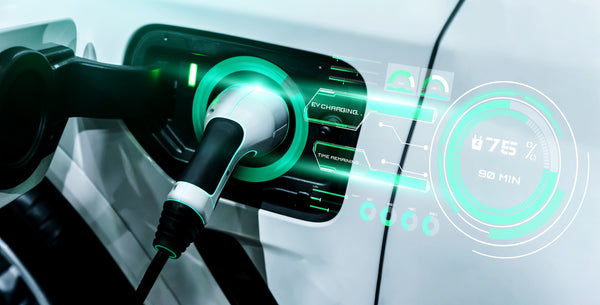
How to Cut Your Charging Time by 50% with EV Fast Chargers
Charging times play a crucial role in the transition to electric vehicles. Just as you expect a rapid refuel or a traditional car, EV drivers deserve the same high power efficiency when charging an electric vehicle, especially when using EV fast chargers.
It’s important to understand that charging times are influenced by both the EV battery capacity in your electric car and the power output of the charging station.
EV fast chargers are perfect for situations where your vehicle is parked for a few hours. These include hotels, shopping centres/ supermarkets, leisure centers, tourist attractions and car parks where you will plug in and spend more than an hour.
Read our expert guide to find out more about EV fast charging, their functionality and the charging speeds you can achieve.
What is EV Fast Charging?
EV fast charging are charge points that deliver between 7kW and 22kW and are predominantly found in residential areas as well as areas of long visiting periods.
Shop the best-selling EV chargers today!
These charge points supply electricity in the form of alternating current (AC). However, since electric vehicle (EV) batteries exclusively store direct current (DC) energy, the AC must undergo conversion within the vehicle.
This additional conversion step is what results in AC fast charging being slower compared to DC rapid charging but considerably faster than standard EV chargers.
Different levels of fast EV charging are created from the power involved
What are the different levels of EV Fast Chargers?
One of the most noticeable changes you’ll experience when transitioning to electric vehicle (EV) driving is the time it takes to recharge your car.
To help you understand these differences in charging speeds, below is a brief overview of the main types of ev fast charging options that are found in the UK today:
22kW: fast charger
22kW fast chargers are found in both public places and private residences. To get a 22kW charger at home, you would need to upgrade to ‘three-phase electricity’, which can cost over £10,000, as well as needing permission from the network operator. A growing number of new-build developers are now choosing to include this charging network option in their construction to make the transition to EV fast charging even simpler.
Average time to charge a battery from empty: 3- 4 hours
50kW: rapid charger
Public charging stations often offer rapid charging, quickly replenishing your electric vehicle’s battery to 80%. After that, charging slows down for the last 20% to protect battery health. This technology reduces the downtime of your vehicle and boosts confidence during long trips.
Average time to charge a battery to 80%: 40 mins- 1 Hour
350kW: ultra-rapid public charger
Ultra-rapid EV chargers boast impressive speeds of up to 350kW. However, very few electric vehicles currently on the market are capable of using this incredible technology. This is expected to change in the coming years as technological advancements pave the way for ultra-rapid charging capabilities.
Average time to charge a battery to 80%: 20- 25mins
Power VS. Voltage and Current
Power, expressed in Watts, is the product of voltage (Volts) and current (Amperes). Both components are essential for the process of fast charging. To achieve a higher charge rate, you must either increase the rate of power entering the vehicle (the voltage) or increase the current. EV fast chargers are designed to optimise both aspects.
Typically, the term “fast charging” refers to charging speeds of 50kW or greater. In practical terms, this translates to 400 volts and 125 amperes (400V x 125A = 50,000W or 50kW).
The choice of 125 amperes is based on the capabilities of most fast EV chargers. Most 50kW fast chargers are designed to deliver a maximum of 125A.
Advancements in fast charger technology are currently ongoing. Some new 400kW chargers can provide up to 500A with expectations that soon they will accommodate up to 600A. This development signifies a substantial increase in charging capabilities and speeds.
Speeds vary with fast charging dependent on power output and the cable used
How Fast are EV Fast Chargers?
Charging times can significantly vary depending on the charging unit’s speed and the specific vehicle. A 7kW home EV charger can efficiently recharge a compatible electric vehicle with a 40kWh battery in just 4 to 6 hours, while a 22kW charger can accomplish this in 1 to 2 hours.
Most fast chargers operate at 7kW, although some home charging points or workplace chargers do come with attached charging cables. If a cable is tethered, only vehicles compatible with that specific connector type will be able to use it.
Shop home EV chargers at Volta EV.
Below is an EV charging time calculator for commercial fast chargers. It is difficult to accurately predict a precise answer to how fast EV charging is, however, we can provide an estimate in our “EV charging time chart” of how many miles of range a DC fast charger can deliver within 60 minutes:
|
Power output of the charger |
How many miles of range a commercial DC fast charger can deliver within 60 minutes |
|
30 kW |
87 miles/ hour |
|
50 kW |
145 miles/ hour |
|
100 kW |
289 miles/ hour |
|
120 kW |
347 miles/ hour |
|
150 kW |
434 miles/ hour |
|
180 kW |
520 miles/ hour |
|
250 kW |
723 miles/ hour |
|
350 kW |
1012 miles/ hour |
It is also important to remember that charging rates when using a fast charger are influenced by the car’s onboard charger capabilities. Not all vehicles can accept charging rates of 7 kW or higher.
This highlights the importance of understanding both your vehicle and the charging station to maximise efficiency and convenience.
Buying a Fast Charging EV Unit
Ready to cut your charging time by 50% with EV fast chargers? Trust the expertise of Volta EV in supplying you with the best EV fast-charging units that are suitable for your home and property.
Shop online at Volta EV today and browse the biggest brands in EV charging, including Ohme, Easee, PodPoint and MyEnergi (Zappi).
CONTACT US
Mon-Fri 8am to 6pm

